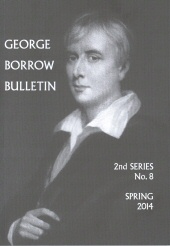- Society
- Bulletin
- Works
- People
- Places
- Other
 The Spring 2014 George Borrow Bulletin is now out
(Series 2, No. 8) and members should receive their copy during
May 2014.
The Spring 2014 George Borrow Bulletin is now out
(Series 2, No. 8) and members should receive their copy during
May 2014.
As members will see, there has been some discussion of providing the Bulletin in electronic (PDF) format which can be read on computers and eBook readers — if you are interested in this more details are in this edition of the Bulletin (see inside cover).
Our esteemed editor finished off the Bulletin just after our memorable weekend in Peterborough, and there’s a couple of coloured photographs from that event: we’ll leave it to Borrovians to work out which these are! The Bulletin also covers our wonderful Norwich weekend. Those who attended received the Conference Proceedings some time ago.
The next edition of the George Borrow Bulletin is being prepared and should be out in Autumn 2014. Contributors please note that the deadline for contributions is 31st August 2014.
George Borrow Bulletin 2nd Series nº 8 (Spring 2014) |
||
News |
||
2 |
|
Membership of the Society; obituary; recent events |
5 |
|
Meeting of the Executive Committee, 1 November 2013 |
7 |
|
Biennial General Meeting of the George Borrow Society, 2 November 2013 |
Articles |
||
16 |
Hentges, John |
A chance encounter: the incredible adventures of Ambrose Gwinnett |
27 |
Hentges, John |
A word on Douglas Jerrold (1803–1857) |
29 |
Mawtus, Mark |
Headlong and Crotchet: The case for Thomas Love Peacock being the serio-comic author |
Notes and Queries |
||
39 |
Barrett, Ken and Missler, Peter |
(1) A tale of woe: Borrow’s proxy encounter with the young man of Colunga |
43 |
Mount, David |
(2) Alan Hunter’s The Norwich Poems: a Borrow-related item |
44 |
Mawtus, Mark |
(3) Other Thimblerig references |
45 |
Ridler, Ann M. |
(4) Borrow’s ‘Songs of Scandinavia’ and Prior’s Ancient Danish Ballads |
54 |
Ridler, Ann M. |
(5) Another Borrow illustration from Look and Learn |
55 |
Ridler, Ann M. |
(6) The Yarmouth bridge disaster of 1845 |
56 |
García, Richard |
(7) Borrow and the Royal Air Force |
59 |
Rossi, Anthony |
(8) Lavengro and d’Eterville: Strangers’ Hall or Luckett’s Court? |
63 |
Rawbone, Michael |
(9) Gypsy Music |
Book Reviews |
||
65 |
Gurney, Trish |
(1) Antonia Fraser, Perilous Question: The Drama of the Great Reform Bill 1832 |
67 |
Missler, Peter |
(2) Juan Manuel Quero Moreno, Educación integral y de vanguardia |
Other |
||
70 |
|
Publications |
75 |
|
Press Cuttings |
76 |
|
Borrow On-line |
77 |
|
The George Borrow Trust Essay Competition 2015 |
77 |
|
The Lavengro Press |
78 |
|
Borrow Portrayed (8) |
80 |
|
Back Numbers of Bulletins, Binders and Proceedings |
 John Hentges was born in rural
Middlesex shortly before the second World War. His earliest
effort – for the school magazine – featured an
article on a tercentenary exhibition of the Grenadier Guards, at
St James’s Palace in 1956. Literary promise lay unfulfilled
as youthful rebellion set in.
John Hentges was born in rural
Middlesex shortly before the second World War. His earliest
effort – for the school magazine – featured an
article on a tercentenary exhibition of the Grenadier Guards, at
St James’s Palace in 1956. Literary promise lay unfulfilled
as youthful rebellion set in.
Years of boozy restlessness as an itinerant building-site worker and, later, journeyman gardener, had succeeded a promisingly ‘respectable’ beginning in a Pall Mall insurance office. Then in late middle age a second reading of Lavengro led to an abrupt life-style reappraisal. In recent years he has made a number of recordings featuring, mainly, readings from George Borrow and Charles Dickens. A former Vice-Chairman of the Dickens Fellowship (Birthplace Branch) he made his stage début in Barnaby Rudge at the King’s Theatre, Southsea in 2012, and is currently involved with the innovative Portsmouth-based professional theatre company, Groundlings.
 Mark Mawtus is an accountant by
profession and has worked in the public sector in recent years.
He has an interest in family history, and is a past member of
both the Council and the Management Committee of the Yorkshire
Archaeological Society. He is also a book and bookplate
collector. Currently a member of the Council of the Private
Libraries Association, his article on the nineteenth-century
bookseller John Cole was included in their journal. He has been a
member of the George Borrow Society since early 2011.
Mark Mawtus is an accountant by
profession and has worked in the public sector in recent years.
He has an interest in family history, and is a past member of
both the Council and the Management Committee of the Yorkshire
Archaeological Society. He is also a book and bookplate
collector. Currently a member of the Council of the Private
Libraries Association, his article on the nineteenth-century
bookseller John Cole was included in their journal. He has been a
member of the George Borrow Society since early 2011.
‘Ambrose Gwinnett’ charts the adventures of a legal apprentice who is wrongly convicted of murder at a Kentish inn in eighteenth-century England. Surviving both noose and gibbet he is spirited out of the country and later meets his supposed victim, Richard Collins, who, like himself, has been incarcerated in a Spanish prison abroad and is now in process of repatriation. The event takes place outside a gaol in Havana, in which Gwinnett has been granted authority over fellow inmates.
Expecting to clear his name Gwinnett obtains permission to accompany Collins home, but mistakenly boards an offshore pirate ship whose crew broke gaol at the aforementioned Havana institution. After a twenty years period of unimaginable privations Gwinnett returns to England, his capital sentence still hanging over him. Richard Collins had not returned. Enfeebled, Gwinnett works first as a crossing-sweeper at Charing Cross and is eventually reduced to beggary.
Gwinnett’s story was the subject of a play first performed in London in 1828, which Borrow had seen. To his astonishment, he discovered that Theodore Watts-Dunton also knew of the play – a fact marking the beginning of their friendship in the 1870s.
Thomas Love Peacock is now largely forgotten, but his novels such as ‘Headlong Hall’ (1816) and ‘Crotchet Castle’ (1831), which could reasonably be described as Serio-Comic, were popular all through the nineteenth and early twentieth centuries. Older than Borrow, he had been a friend of the poet Shelley. The article presents a variety of evidence from the text of Peacock’s works, linking them with Borrow’s ‘Lavengro’. Readers will have to make up their own minds on the case, but the similarity between Sir Walter Scott’s ‘Ivanhoe’ and Peacock’s ‘Maid Marion’ is perhaps the most obvious to lovers of nineteenth-century literature.